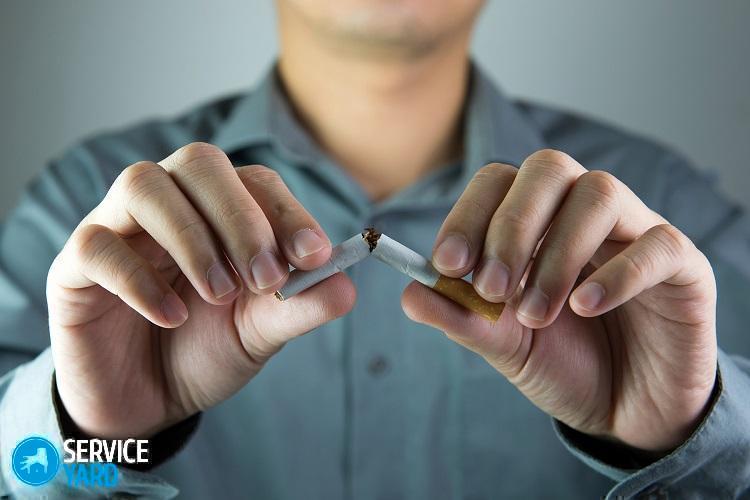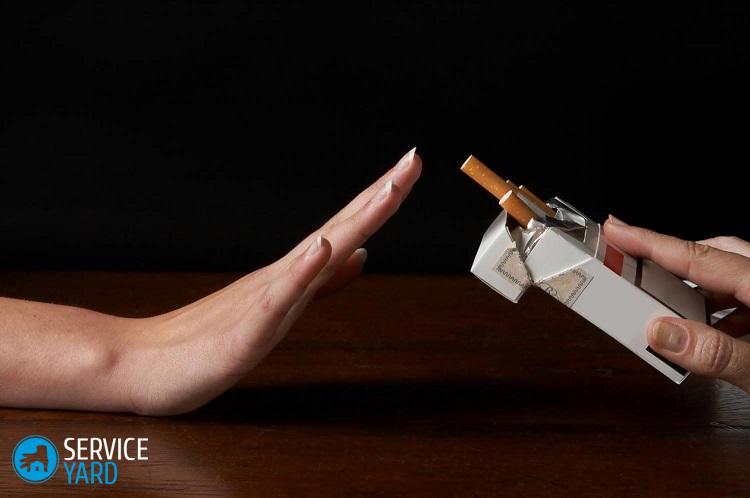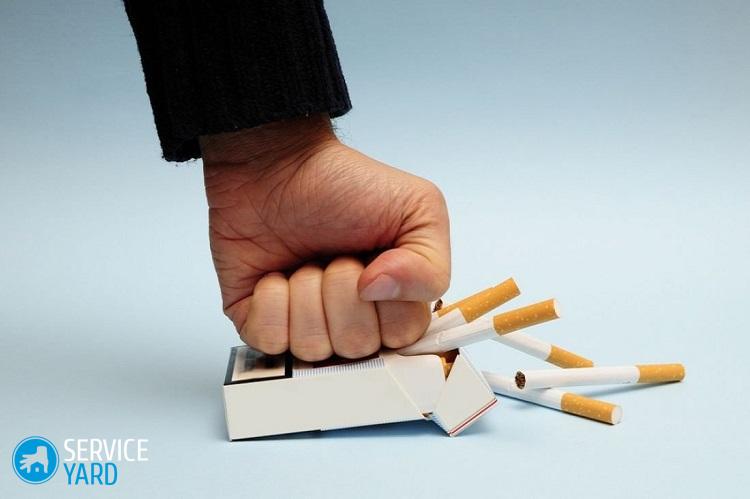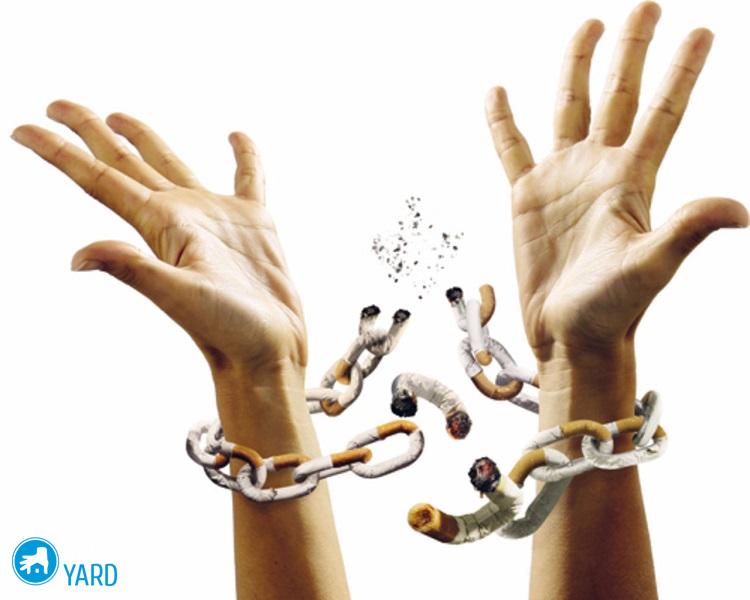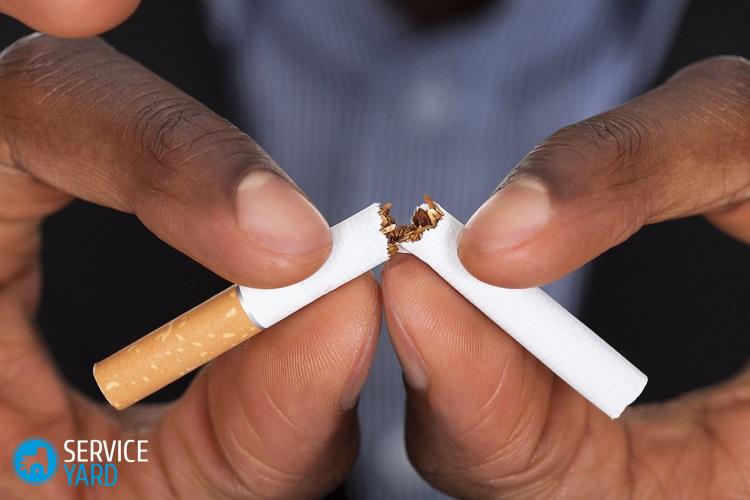What happens if you quit smoking abruptly?

Many have probably tried to part with such a addiction as smoking. Someone is trying to gradually break the habit of nicotine addiction on their own, while others resort to using some auxiliary means such as sprays, plasters or tablets, while others decide to quit abruptly, simply abandoning tobacco once and for all. But what happens if you quit smoking abruptly? There are many different opinions on this subject.
to contents ↑Is smoking cessation harmful?
Of course, a sharp rejection of nicotine can be accompanied by the so-called withdrawal syndrome - it is he who most of all scares people who do not dare to quit. The appearance of these symptoms is associated with various psychological and physiological factors. However, if you adjust yourself to the fact that any changes, including those causing problems, will benefit, then it will be much easier to survive the initial period. Moreover, many of the problems can be prevented or reduced.
There are no reliable statistics that would suggest that people with long smoking experience are more likely to experience smoking cessation. Although the question is what to do if I smoke for 20-30-40-50 years, it arises most often. A huge number of smokers with great experience quit sharply, while not experiencing any special health difficulties. At the same time, there are many cases when someone smoked for a long time and, having quit abruptly, received a deterioration in overall health, the occurrence of acute or exacerbation of chronic diseases.
to contents ↑Important! If you set a goal, but have not yet decided how exactly it is better to do this, also see our cognitive overview of ways and methods, how to quit smoking quickly.
The consequences of abrupt cessation of cigarettes
Many people who decided at one point to get rid of this not-so-good habit would like to know what the consequences of abrupt smoking cessation may be:
- Cough. He already torments many long-time smokers, and after quitting, they can feel that the cough has become much more frequent and with phlegm. If this happens, then you should visit a doctor. Auscultation, or, if necessary, an x-ray, will help to understand whether a cough is a consequence of a disease or is it a cough that appeared due to the active cleansing of the lungs.
- Dizziness. When exposed to nicotine, the vessels of the brain narrowed. In the absence of nicotine intake, the vessels begin to return to normal tone (as far as this is achievable after a long time). The brain, “stunned” by the increased flow of oxygen and blood, gives a reaction in the form of dizziness.
- Sleep disturbance. The causes of insomnia or excessive drowsiness lie in the ongoing restructuring of the body to work in conditions without nicotine. This is an increased supply of oxygen (which gives an activating effect), and the influence of psychological discomfort, and nervousness due to the fact of failure.
- Dyspepsia, problems with stool. Frequent stool, constipation, or abdominal pain can be associated with the influence of nicotine on the tone of the intestine, which can increase under its influence, and the body gets used to it and adjusts over time.When nicotine is absent, the tone changes, and in which direction it is impossible to predict. That is why someone may suffer from constipation, and someone - on the contrary, endless diarrhea.
- Unstable mood, nervousness. Firstly, these signs are associated with psychological discomfort - smoking becomes a part of everyday life, often pauses filled them, and many people use cigarettes as a calming moment. Secondly, nicotine is a stimulator of the release of special substances - neurotransmitters and hormones that affect the perception, mood and reaction to certain situations in life. Thirdly, do not neglect the social consequences, because for many people smoking is an occasion for communication, a way to maintain or make contact.
to contents ↑Important! To reduce any possible negative manifestations, you can try from the first day to slightly adjust your diet and maintain the body in good condition. To do this, our articles will help you:
5 “for” abrupt smoking cessation
Since many smokers are interested in the question of whether it is possible to quit smoking abruptly, we decided to present several positive points with this approach:
- From the first day of quitting nicotine, the body begins to cleanse from the effects of prolonged smoking. On average, cells are renewed in 40-60 days, so after a couple of months without cigarettes, the body can be considered cleaned of toxins and harmful substances.
- The work of the neurotransmitter system is normalized. The body begins to actively produce hormones of pleasure, even without the receipt of a stimulant from the outside (nicotine).
- Studies show that there is no particular difference in effectiveness between a sharp rejection of nicotine and a gradual decrease in the number of cigarettes smoked.
- With a sharp rejection, a closed cycle does not form (which is difficult to stop), when a person who feels bad about smoking is not able to give up tobacco, because he is afraid that without cigarettes he will become even worse.
- Practice shows that abrupt cessation of cigarettes in combination with the support of medical workers or relatives gives better results in terms of effectiveness than support combined with gradual cessation.
to contents ↑Important! Having clearly decided to quit smoking, relieve yourself of the possible surrounding reminders. Put things in order at home by throwing away all the “psychological anchors” associated with smoking, as well as get rid of the smell of tobacco.
5 “against” abrupt smoking cessation
Despite the above positive aspects, there can also be negative consequences of a sharp quitting smoking, namely:
- A sharp rejection of tobacco affects overall well-being, and after that on mood. It has been proven that people with a depressed mood are much more likely to break down and light a cigarette after a fairly short time after refusal.
- A sharp rejection of cigarettes can cause withdrawal symptoms, with a high degree of severity in comparison with a gradual withdrawal.
- People who quit smoking abruptly often return to smoking under pressure from others.
- Smokers with long-term (more than 15 years) smoking experience or at the age of 55 years are very difficult to tolerate a sharp rejection due to the formed physical dependence. There is also a high risk of exacerbation of existing chronic diseases, often hidden, which can cause serious health consequences.
- There are hidden factors that are the reason that six months after quitting nicotine, abrupt quitters may experience a pronounced withdrawal syndrome about 1.4 times more often than those who quit gradually.
Is it possible to quit smoking abruptly during pregnancy?
There is no reliably confirmed fact that the fetus will suffer if his previously smoking mother quits smoking.On the contrary, it has long been known that smoking women have a significantly higher risk of having a baby with hypotrophy, reduced body weight, a violation of the immune system with its frequent consequences in the form of frequent and long-running colds at an early age, often with complications.
In addition, mothers themselves may suffer from gastrointestinal upset, hypoxia, and respiratory system impairment. Also, smoking women are twice as likely to develop pregnancy complications.
So, the answer to the question of whether it is possible to quit smoking abruptly during the onset of pregnancy is obvious: it is worth quitting immediately and forever, and at the earliest possible date of pregnancy.
to contents ↑Doctors opinion
Doctors (in any case, domestic) do not have any unanimous opinion regarding the abrupt cessation of smoking. But they still agree with the opinion of foreign colleagues who are involved in the problems of refusal: the smoker should choose the method of refusing nicotine on the basis of many objective and subjective factors.
to contents ↑Important! A comparative analysis shows that if a sharp rejection of cigarettes is combined with support from psychologists, reference groups, health workers, as well as the use of drugs for smoking, then after 6 months the number of those who do not return to nicotine will be approximately 4 times higher than those who quit smoking abruptly, but without any support.
Stock footage
As soon as it comes to ways to quickly quit smoking, immediately there are people who claim that abruptly giving up nicotine is harmful and dangerous to health. Indeed, this is how many people want to think, and especially smokers with experience. But what happens if you quit smoking abruptly? - In general, it all depends on the individual characteristics of the body, as well as the psychological mood of the person himself. But, as a rule, nothing critical happens, so if you still decide to quit smoking, then abruptly giving up cigarettes is a good option.



